Issue Archive
Table of Contents
BLOOD COMMENTARIES
PLENARY PAPER
Whole-genome landscape of adult T-cell leukemia/lymphoma
Adult T-cell leukemia/lymphoma (ATL) is an aggressive neoplasm associated with infection with human T-cell leukemia virus 1 (HTLV-1). In a Plenary Paper, Kogure et al report the results of whole-genome sequencing of 150 ATL patient samples, describing 11 new driver mutations, including mutations in CIC that are present in 33% of cases. They also delineate mutation profiles that can distinguish ATL with a leukemia vs a lymphoma phenotype. These new insights may improve ATL diagnosis and provide novel entry points for new therapies.
REVIEW SERIES
EBV+ lymphoproliferative diseases: opportunities for leveraging EBV as a therapeutic target
Edited by Jean Soulier, this series features state-of-the-art reviews on Epstein-Barr virus–related lymphoproliferative diseases by Toner and Bollard, HIV-related hematologic cancers by Carbone et al, and Kaposi sarcoma herpesvirus (human herpesvirus 8)–mediated hematologic diseases by Cesarman et al. Along with this issue’s Plenary Paper on HTLV-1-related leukemia/lymphoma, this series provides a timely overview of the role of viruses in hematologic malignancy.
Hematologic cancers in individuals infected by HIV
Edited by Jean Soulier, this series features state-of-the-art reviews on Epstein-Barr virus–related lymphoproliferative diseases by Toner and Bollard, HIV-related hematologic cancers by Carbone et al, and Kaposi sarcoma herpesvirus (human herpesvirus 8)–mediated hematologic diseases by Cesarman et al. Along with this issue’s Plenary Paper on HTLV-1-related leukemia/lymphoma, this series provides a timely overview of the role of viruses in hematologic malignancy.
KSHV/HHV8-mediated hematologic diseases
Edited by Jean Soulier, this series features state-of-the-art reviews on Epstein-Barr virus–related lymphoproliferative diseases by Toner and Bollard, HIV-related hematologic cancers by Carbone et al, and Kaposi sarcoma herpesvirus (human herpesvirus 8)–mediated hematologic diseases by Cesarman et al. Along with this issue’s Plenary Paper on HTLV-1-related leukemia/lymphoma, this series provides a timely overview of the role of viruses in hematologic malignancy.
CLINICAL TRIALS AND OBSERVATIONS
Pembrolizumab for B-cell lymphomas relapsing after or refractory to CD19-directed CAR T-cell therapy
Clinical Trials & Observations
CD19-directed chimeric antigen receptor (CAR) T cells can achieve remissions in patients with relapsed/refractory large cell lymphomas; however, relapses are common. Some relapses result from loss of CD19 expression, while others are associated with T-cell exhaustion, Chong and colleagues report results of 12 patients with relapsed/refractory lymphoma treated with the checkpoint inhibitor pembrolizumab. Four patients derived clinical benefit, exhibiting CAR T-cell expansion and decreased markers of T-cell exhaustion.
HEMATOPOIESIS AND STEM CELLS
Gain-of-function mutations in RPA1 cause a syndrome with short telomeres and somatic genetic rescue
Clinical Trials & Observations
Telomere biology disorders (TBDs) are heterogeneous syndromes caused by mutations in telomere-associated genes. Sharma et al report a novel TBD gene responsible for varying TBD clinical features in 4 unrelated individuals. One patient manifested somatic genetic rescue in hematopoietic cells, leading to loss of the mutant allele and stabilization of blood ocunts. This report expands the genetic spectrum of TBDs.
LYMPHOID NEOPLASIA
MYELOID NEOPLASIA
Asxl1 loss cooperates with oncogenic Nras in mice to reprogram the immune microenvironment and drive leukemic transformation
The chromatin regulator ASXL1 is frequently mutated in chronic myelomonocytic leukemia (CMML), conferring a poor prognosis that is made worse by the presence of concurrent NRAS mutation. You and colleagues demonstrate that concurrent NRAS mutation in ASXL1-null cells from genetically modified mice phenocopies CMML and that 50% of mice progress to AML. They further report that the combined mutations lead to T-cell exhaustion and a suppressive immune microenvironment, suggesting that targeted therapy plus immunotherapy could improve the poor prognosis of this subset of patients.
PLCG1 is required for AML1-ETO leukemia stem cell self-renewal
PHAGOCYTES, GRANULOCYTES, AND MYELOPOIESIS
An improved index for diagnosis and mortality prediction in malignancy-associated hemophagocytic lymphohistiocytosis
CME
Clinical Trials & Observations
Hemophagocytic lymphohistiocytosis (HLH) is a hyperinflammatory syndrome for which hematologic malignancy (HM) is a recognized trigger. Zoref-Lorenz et al studied 225 adult patients with HM with and without HLH by the HLH-2004 criteria.They report that combined elevation of soluble CD25 and ferritin at optimized cutoff values defines an “optimized HLH inflammatory” index that accurately identifies patients fulfilling HLH criteria; however, more importantly, it also predicts high mortality risk whether or not patients fulfill HLH criteria.
LETTER TO BLOOD
Diminished ovarian reserve in young women with sickle cell anemia
Clinical Trials & Observations
Women with sickle cell anemia (SCA) have higher rates of diminished ovarian reserve (DOR) than age-matched controls. Pecker et al report a small study of patients with SCA that compares ovarian reserve in patients after stem cell transplant, on therapy with hydroxyurea (HU), and on supportive care. As expected, patients who received transplants have severe DOR. About one-third of patients on HU have DOR, while DOR was absent in patients on supportive care. Whether this reflects an impact of HU or is a biomarker of severe disease remains to be established in a larger study.
BLOOD WORK
CONTINUING MEDICAL EDUCATION (CME) QUESTIONS
-
Cover Image
Cover Image
![issue cover]()
Diffuse large B-cell lymphoma with immunoblastic-plasmacytoid features in an individual infected by HIV. Tumor cells display large cytoplasms and round or oval nuclei with large nucleoli and express cytoplasmic staining for CD138 (red). See the article by Carbone et al on page 995.
- PDF Icon Front MatterFront Matter
- PDF Icon Table of ContentsTable of Contents
- PDF Icon Back MatterBack Matter
- PDF Icon Editorial BoardEditorial Board
Advertisement intended for health care professionals
Email alerts
Advertisement intended for health care professionals


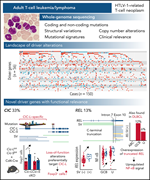
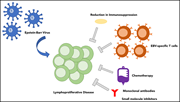


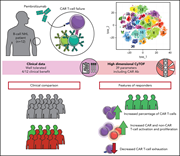
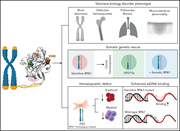
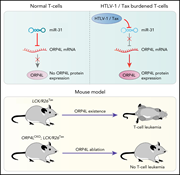
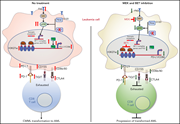

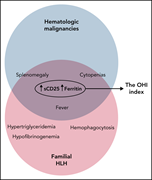

Adult T-cell leukemia: genomic analysis